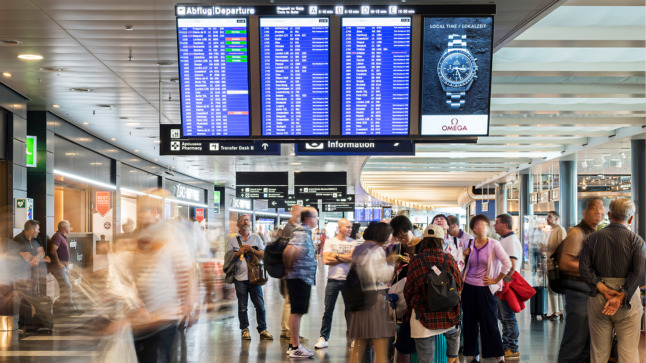In a press conference on Friday afternoon, Health Minister Alain Berset outlined tighter measures that will be implemented from Monday for travellers arriving in Switzerland from abroad.
Those who have no Covid certificate to prove vaccination or those who cannot show proof of having had the virus and recovered in the past six months will have to show proof of a negative test upon arrival in Switzerland.
Four to seven days later, they will have to undergo another test.
Keep in mind that these rules only apply to arrivals from countries not on the SEM high-risk list. As the United States and United Kingdom are considered high risk, only vaccinated people from those countries can arrive in Switzerland. Click here for more information.
Bern said the measures were a bid to prevent a spike in cases once people start returning from their autumn vacation, following a surge in Delta variant infections after the summer holidays.
Additionally, everyone arriving in Switzerland, regardless of their vaccination or recovery status, will have to fill out an entry form.
The cantons are required to carry out random checks to verify whether unvaccinated travellers have actually undergone a second test.
Whoever violates these rules will incur a fine of 200 francs for entry without a test certificate and 100 francs for an incomplete form.
More than two million people and one million vehicles cross landlocked Switzerland’s borders every day.
Cross-border workers, travellers in transit, long-haulers, and people living in regions bordering Switzerland will be exempted from these rules, Berset said.
“The new rules are not a panacea but new measures are needed to prevent the health system from being overburdened”, Berset noted.
The measures are not as drastic as one of the other options debated that would require arrivals without a Covid certificate to go into quarantine for 10 days, with people allowed to leave quarantine from the seventh day with a negative test result.
The new rules will go into effect a week after the general extension of the Covid certificate was implemented in Switzerland to nearly all indoor venues.
READ MORE: TODAY: Switzerland extends Covid certificate for entry to restaurants and bars
Vaccination rates in Switzerland are lagging behind those of its neighbours, with only 53.3 percent of the population fully immunised.
Some 31 percent of intensive care unit beds are filled with Covid-19 patients.
Switzerland now requires people to show proof of vaccination, recovery or a negative test to go into bars and restaurants, cinemas, exhibitions and indoor sporting events.
From Monday, foreign visitors vaccinated abroad with a jab approved by the European Medicines Agency will be able to obtain a Swiss Covid certificate enabling them to enter restaurants and venues.
Protests against measures in Switzerland
The restrictions are unpopular with sections of the Swiss population, and demonstrations — normally rare in Switzerland — are on the increase.
On Thursday evening, some 3,000-4,000 people marched in the capital Bern in opposition to the measures and restrictions.
Some attacked the fence surrounding the Federal Palace, seat of the government and parliament, and the police responded with water cannon and rubber bullets, Swiss news agency ATS reported.
“Anything that is an act of violence is condemned without restriction,” Swiss President Guy Parmelin told a press conference on Friday.



 Please whitelist us to continue reading.
Please whitelist us to continue reading.
Member comments